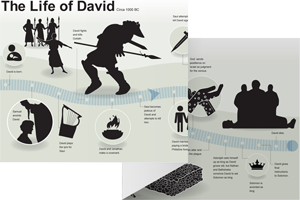20:1–42 In this chapter, David approaches Jonathan and asks why Saul wants him killed (v. 1). Jonathan asserts that Saul means him no harm. They devise a plan to test the king, which confirms David’s suspicions (vv. 3–34). Remaining faithful to his covenant (see 18:1–4), Jonathan warns David, who has gone into hiding, that Saul will try to kill him (vv. 35–40). The men make vows of friendship to one another, and Jonathan sends David away in peace (vv. 41–42). |
20:1 David fled from Naioth in Ramah Saul was there (see 19:18–19, 23).
20:2 Far from it Jonathan moves to assure David that Saul will not succeed.
20:3 as Yahweh lives David’s oaths function to emphasize the gravity of the situation as perceived by David.
20:5 tomorrow is the new moon David decides to exploit customary religious practices (see Num 10:10; 28:11–15).
20:6 to Bethlehem his city David asks Jonathan to lie for him. This is the first character flaw in David that the narrator mentions; he has otherwise been blameless to this point.
20:7 know that he has decided to do me harm He plans to kill him during or after the feast.
20:8 into a covenant of Yahweh with you See note on 1 Sam 18:3.
kill me yourself David proposes an alternative to his plan. In keeping with their covenant (see 18:1–4), David asks Jonathan to kill him if he knows of any guilt that would merit Saul’s wrath. Apparently, neither party considered the proposed lie to be wrong, since it protected an innocent life.
20:11 to the field See 19:3 and note.
20:13 as he has been Jonathan uses the past tense to note God’s favorable dealings with Saul. This may also hint at Jonathan’s understanding of David’s future kingship.
20:14 while I am still alive Jonathan realizes that he is endangering his own life by helping David.
20:15 do not cut off David honors this covenant even after Jonathan’s death. Rather than killing every descendant of Saul, he elevates Jonathan’s son Mephibosheth to a position of honor (see 2 Sam 9). David also exercises restraint by not killing Mephibosheth after a perceived attempted coup (see 2 Sam 16:3; 19:24–30).
20:16 May Yahweh call the enemies of David to account Refers to Jonathan’s own father—Saul.
20:17 he loved him On the dynamics of Jonathan’s love for David, see 1 Sam 18:1 and note.
20:25 the seat by the wall Likely located at the head of the table. This would also prevent anyone from approaching the king from behind.
Abner sat beside Saul The commander of Saul’s army; See 14:50.
20:26 He is not ceremonially clean Saul’s initial assessment gives the benefit of the doubt to David. He assumes that David will not violate the Law by attending a festal celebration while ceremonially unclean (see Lev 7:20–21).
(see Lev 7:20–21).
20:27 the son of Jesse Saul refuses to call David by his name; going forward he uses this moniker to identify David as his enemy (e.g., 1 Sam 20:30–31; 22:7–9, 13).
20:29 my brother commanded me Jonathan takes liberties in his response to Saul (compare with v. 6). Apparently David’s oldest brother, Eliab, has taken over family leadership responsibilities from their father.
20:30 a perverse, rebellious woman In his angry outburst, Saul shames Jonathan’s mother, Ahinoam (see 14:50).
20:31 you and your kingdom will not be established Saul makes one final appeal to Jonathan’s personal security. However, this statement is yet another indictment of Saul’s disconnect and paranoia. The kingship has already been taken from him, and it is not his to pass on.
20:33 Saul hurled his spear at him In his delusion and rage, Saul attempts to murder his own son, the crown prince.
20:38 called out after the boy This is an additional message for David: He needed to leave town quickly.
20:41 they kissed each other A customary ancient Near Eastern sign of familial love, goodwill, and friendship used in greetings, farewells, and blessings (e.g., Gen 29:13; 31:28; 33:4; Exod 4:27; Ruth 1:9; 1 Sam 10:1; 2 Sam 14:33; Acts 20:37).

|
About Faithlife Study BibleFaithlife Study Bible (FSB) is your guide to the ancient world of the Old and New Testaments, with study notes and articles that draw from a wide range of academic research. FSB helps you learn how to think about interpretation methods and issues so that you can gain a deeper understanding of the text. |
| Copyright |
Copyright 2012 Logos Bible Software. |
| Support Info | fsb |
 Loading…
Loading…


